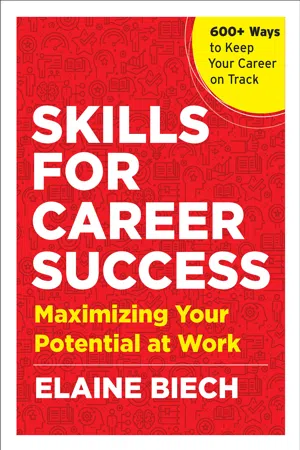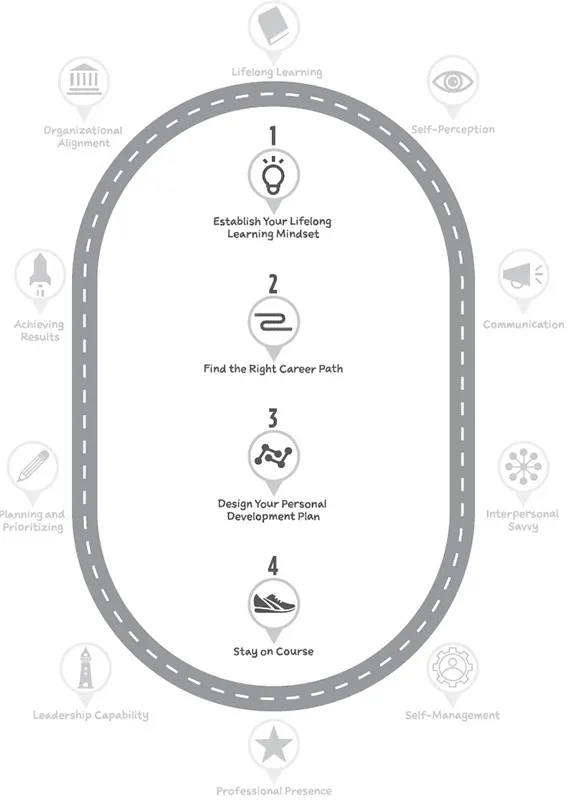![]()
PART ONE
TAKE CHARGE OF YOUR CAREER
![]()
STEP 1
Establish Your Lifelong-Learning Mindset
Benjamin Franklin is a model for lifelong learning. A founding father of America, he helped draft the Declaration of Independence and the U.S. Constitution; negotiated the 1783 Treaty of Paris, ending the Revolutionary War; invented bifocal glasses, the rocking chair, the Franklin stove, the American penny, the armonica (a glass musical instrument), and a flexible catheter; was the first postmaster general for the colonies; and organized the first successful American lending library. He also published Poor Richard’s Almanack 25 consecutive years and the Pennsylvania Gazette, the most widely read paper in the colonies; he discovered the Gulf Stream; he invented the lightning rod based on his famous kite-and-key experiment; and he taught himself to swim, crafting his own wooden flippers.
In 1749 he wrote an article about education in Pennsylvania that resulted in establishing the Academy of Philadelphia, now the University of Pennsylvania. His self-education earned him honorary degrees from Harvard, Yale, the University of Oxford, and the University of St. Andrews (Isaacson 2003).
Quite impressive for someone who was born the 15th of 17 children and dropped out of school at the age of 10. Franklin, who now graces the U.S. 100 dollar bill, accomplished all this based on self-learning through reading and experience.
What can we learn from Benjamin Franklin, perhaps one of the original lifelong learners? Franklin had a voracious appetite for learning, resulting in the accomplishment of a profuse number of major contributions to society. So how did he do it, and how does that translate into our world of lifelong learning today?
• Set goals and track them. Franklin set time to complete his “present study” or focus on his “virtues list” and tracked the results (Franklin 2016).
• Create a plan. Franklin created a plan for every day, following a similar schedule because he believed in the benefits of routine and healthy habits.
• Schedule time to learn. Franklin scheduled time to learn by getting up early in the morning and reading and writing for at least an hour, sometimes reading all night so that he could return a borrowed book.
• Incorporate experiential learning when possible. Franklin turned his concepts and hypotheses into experiments.
• Reflect on what you’re learning. Franklin reflected on each day, asking, “What good have I done today?”
• Balance your life and include rest and fun. Franklin enjoyed laughter and leisure time with friends and family, including a two-hour lunch every day, although he did not allow it to take over time for learning.
LIFELONG LEARNING AND YOUR ORGANIZATION
According to the Association of Talent Development (ATD), lifelong learning is the “self-motivated, ongoing pursuit of knowledge for personal or professional reasons. It may occur formally or informally, intentionally, or incidentally.” Lifelong learning is also known as continuous learning, agile learning, or learning drive. Lifelong learners are self-motivated, have insatiable curiosity, and practice intelligent risk taking. They continually seek knowledge and are open to learning new skills.
Lifelong learning is associated with two learning theories: cognitivism and constructivism. Cognitivism addresses the learning that occurs when you make sense of the relationship between what you know and what you are learning. Constructivism, on the other hand, proposes that learning comes from many sources, including life experiences, and that what you learn is dependent on your traits and how you internalize what you have learned.
Your organization is likely interested in lifelong learning not from a theoretical angle but from a much more practical perspective. Think about it. Your organization must keep up with the technology, economic, geographic, political, and demographic changes it is facing. It must be an agile organization. It comes as no surprise, then, that its employees must also be agile to support the organization. The organization is learning new things, so employees must also learn new things. Lifelong learning is a critical skill for organizations because learning and agility are the keys to remaining competitive.
An organization that values learning and hires employees who value continuous learning has a strong future. In return, learning organizations that help their employees shape the future directions of their careers encourage engagement. Today’s organizations expect that employees will be accountable for their own development and that they will seek the support and resources they need.
Are you an employee who values lifelong learning? If so, you aren’t alone. Recent research shows that employees want opportunities to learn and grow at work. They want their managers to coach them and to value them as both people and employees, and to help them understand and build their strengths (Gallup 2016). As a skilled employee you want to learn and gain skills to be more valuable to your organization. That is possible as a lifelong learner. You know that you have responsibility for meeting your development needs. The first step is knowing what it takes to be a lifelong learner.
LIFELONG LEARNERS
Who are lifelong learners? ATD’s lifelong-learning research shows that organizations considered “high performers are more likely to make developing lifelong-learning behaviors a priority” (ATD 2018, 8). Actually, if the rate of change continues to accelerate, every employee will need to be a lifelong learner. According to the study, lifelong learners
• view learning as an exciting opportunity,
• are self-motivated,
• are self-aware and know their own interests,
• are open-minded,
• have an insatiable curiosity.
Are you a lifelong learner? You may be, but just haven’t acknowledged it yet. Most of us learn for personal or professional development, but the two may not be distinctly different since developing personally can also improve your professional knowledge and skills, and vice versa. Besides, there doesn’t need to be a reason to learn, since learning for the sake of learning can be a rewarding experience. When you read Franklin’s story, you get a keen sense of that—Franklin loved to learn.
ADVANTAGES OF LIFELONG LEARNING
You are the key benefactor of lifelong learning, with advantages that span both your personal life and your professional life. Think of how you benefit personally first. Learning increases your confidence and self-esteem. It improves your quality of life and ensures a more satisfying life with your family and friends. It helps you be more flexible and increases your interpersonal and communication skills. It encourages your creativity and innovation and challenges your beliefs and opinions.
You benefit professionally by increasing your adaptability to change. If you are like most employees, you want to learn, develop, and grow. A culture of lifelong learning enhances your understanding of the world around you and your organization. It increases your readiness for opportunities. For employees, successful job performance is related to an individual’s desire to learn. Lifelong learning will certainly improve your performance and your professional demeanor. It improves both your satisfaction with your work and your engagement level. Continuous learning will increase your opportunities for career advancement and will make it less likely that you will derail (see Challenge 2) from your career.
Although you and your colleagues may seem to benefit the most from lifelong learning, your organization also gains value from investing in a culture that supports lifelong learning. For example, employers want employees who can solve problems, communicate clearly, think critically, and collaborate with others; these skills are often a result of self-aware employees who are open to learning. ATD’s (2018, 19) lifelong-learning research showed that the top five benefits to the organization include improved
• employee engagement levels,
• overall organizational performance,
• ability to retain talent,
• ability to meet changing business needs and objectives,
• business competitive ability.
Learning organizations are places “where people continually expand their capacity to create the results they truly desire, where new and expansive patterns of thinking are nurtured, where collective aspiration is set free, and where people are continually learning how to learn together” (Senge 2006, 3). Harvard Business Review describes the advantages of a learning organization as “improved innovation, agility, and organizational learning” (Groysberg et al. 2018, 49). Lifelong learning benefits you and your colleagues as well as delivers value to your organization.
PRACTICE LIFELONG LEARNING
Take a moment to think about all that you know and all that you still want to learn. I get exhausted just thinking about everything I need to know to do my job. This is what makes my work so exciting, but this sense is also what necessitates that each of us becomes a lifelong learner. Who determines whether you know enough? Know the right things? What you still should learn? Well it’s you, of course. Lifelong learning isn’t new—as Franklin showed us. What’s new is the emphasis it is receiving in today’s business environment.
I once read that most people achieve only a third of their pot...


